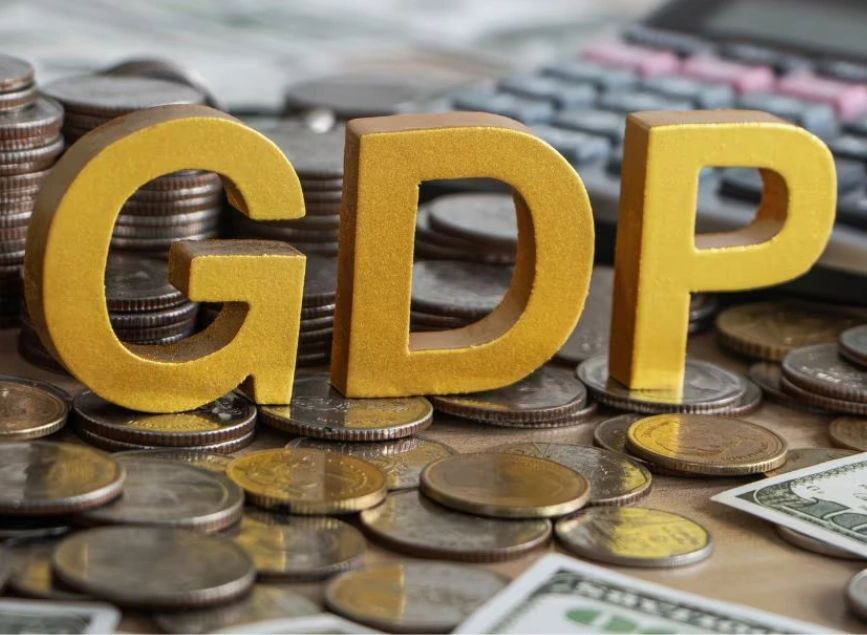
What Is GDP? A Complete Guide to Gross Domestic Product
Estimated reading time: 3 minutes
Table of contents
GDP or Gross Domestic Product is one of the most powerful indicators used in global economics. It plays a central role in the decision-making processes of investors, central banks, governments, and market analysts alike.
In this guide, we’ll break down GDP in clear, practical language from what it really means, how it’s calculated, and how it shapes financial markets and trading strategies. If you’re aiming to deepen your economic literacy, this article is your launchpad.
What Is GDP?
Gross Domestic Product (GDP) represents the total value of all final goods and services produced within a country during a specific time period (typically a quarter or year).
➡️ It reflects the size and health of a nation’s economy.
➡️ A rising signals growth; a declining signals slowdown or recession.
How Is GDP Calculated?
it can be measured through three major approaches:
1️⃣ Production Approach
GDP = Total Output – Intermediate Consumption
This method sums up the value added by all industries.
2️⃣ Income Approach
GDP = Wages + Profits + Rents + Interest + Taxes – Subsidies
This method looks at who earns from economic activity.
3️⃣ Expenditure Approach (most common)
GDP = C + I + G + (X − M)
Where:
- C = Consumer spending
- I = Business investment
- G = Government spending
- X = Exports
- M = Imports
Types of GDP
| Type | Description |
|---|---|
| 🏷️ Nominal | Measured at current prices — includes inflation. Not ideal for long-term comparison. |
| 📉 Real | Adjusted for inflation — gives a clearer view of real economic growth. |
| 👥 Per Capita | GDP divided by the population — shows relative living standards. |
Why Is GDP Important?
Changes in GDP reflect the broader economic condition:
✅ Rising = Economic expansion, job growth, bullish sentiment
❌ Falling = Recession, job cuts, declining business activity
➡️ Central banks use it data to guide monetary policy decisions (like interest rates).
Read More: Understanding Technical Analysis
GDP and Financial Markets: A Powerful Signal
💼 Stock Market
- Strong = Higher corporate earnings → Stock prices rise
- Weak = Caution → Sell-offs in equities
💱 Forex Market
- A strong report can boost the national currency
- Weak = Sell pressure on the currency
Crypto & Gold
- In recessions, safe-haven assets like gold and Bitcoin often shine
- In booms, risk-on assets typically outperform
GDP vs. Interest Rates
There’s a tight connection between GDP growth and interest rate policy:
| Scenario | Central Bank Reaction |
|---|---|
| 🔺 Grows Rapidly | Raise interest rates to control inflation |
| 🔻 Falls / Recession | Cut interest rates to stimulate the economy |
👉 This dynamic directly affects traders’ positioning in currencies, bonds, and equities.
Trading Strategies Around it
1. News Trading (Short-Term)
Use GDP releases for high-volatility trades:
- Above expectations → Buy currency/stocks
- Below expectations → Sell currency/stocks
2. Mid-Term Trend Analysis
Look for consistent GDP growth or contraction over several quarters to identify economic cycles.
3. Macro Strategy (Blended)
Combine it with other indicators like:
- Inflation
- Unemployment rate
- PMI (Purchasing Managers’ Index)
This paints a more complete economic picture.
GDP Limitations: What It Doesn’t Show
While crucial, it has blind spots:
- ❌ Doesn’t reflect income inequality
- ❌ Doesn’t account for environmental damage
- ⏱️ Released with time lag (weeks after quarter-end)
- 📉 Subject to revisions, which may alter the initial outlook
Final Thoughts: GDP, The Compass of Modern Economies
GDP is more than a number, it’s the economic compass used to navigate financial decision-making. It’s a core driver behind market behavior, government policies, and investment flows.
Smart investors and traders who understand signals can develop more resilient and forward-thinking strategies, whether they’re trading currencies, stocks, crypto, or commodities.
Share
Hot topics

Best broker for gold trading
There’s always been a certain magic about gold. Before online charts and trading applications, people stored their wealth in coins and bars, trusting that gold would retain its value during...
Read more




Submit comment
Your email address will not be published. Required fields are marked *